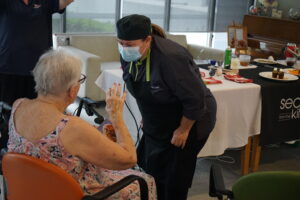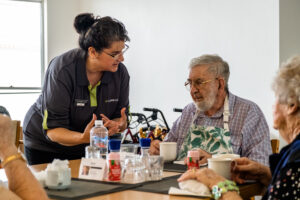With so many competing priorities, resource allocation and budgeting within an aged care facility can be a challenging balancing act. The Royal Commission into Aged Care recently brought to light some of the shortcomings the industry faces in this area, one of which can sometimes risk falling by the wayside – budget. However, since the Commission, we’ve seen a wave of internal restructuring to modernise aged care food services and an increasingly bright spotlight on the importance of delivering quality catering to residents.
Budgeting for the Kitchen
Given the significance of core business activities to operate an aged care facility and ensure quality care to residents, prioritising funding and budgeting correctly for the catering solution can often be overlooked.
For example, wage overheads are generally the largest ongoing expense that any business will contend with, which both eats up the majority of the operating budget and can have administrations hard-pressed to afford any more staff (Davidson, 2018). If budgeting for experienced and dedicated catering staff hasn’t made the priority list, this can cause even more headaches.
Something that can also contribute to the needs of the kitchen falling behind is the belief that the government provided funding is more than enough to cover the costs of catering for residents while delivering a quality experience. The unfortunate reality is that the Commonwealth Own Purpose Expenditure (COPE) is not in line with Australia’s Consumer Price Index, and is not keeping pace with rising inflation and the cost of living. As other more urgent costs like resident healthcare continue to escalate, catering simply hasn’t been the highest priority.
Prioritising Catering Post-Commission
Since the 2021 Royal Commission into Aged Care Quality & Safety brought to light some of the shortcomings some facilities who relied upon in-housing catering suffered, the public has made louder and louder calls for improvements to funding to be made. In 2022, the government introduced the Basic Daily Fee Supplement – an additional ten dollars per resident per day of Commonwealth funding, explicitly intended to improve the catering and level of nutritional care for older Australians.
Following the Commission, as the public attitude towards aged care has begun to include higher expectations and external funding has become more readily available, providers are also beginning to focus on a few key areas of their catering solution to build a system of truly resident-focused care:
Building the Right Team
Your team is both the face of your facility and your residents’ primary point of contact, so it’s vital that they are equipped and educated to make each mealtime experience a positive one.
Your residents are likely to require differing levels of care depending on their health, and your team members will need to be able to understand, prioritise, and react accordingly to different situations that may arise as a result. The same applies to their nutritional needs. Elderly residents who are suffering from dysphagia may require additional staff attention; both in the kitchen to prepare meals that they can safely eat and enjoy, as well as in the dining hall to ensure that they can enjoy their meal safely.


Catering Begins in the Kitchen
A positive mealtime experience always begins in the kitchen, and it’s key that your facility is equipped to prepare fresh and nutritious food for your residents. A modern, appropriately equipped kitchen should have a range of equipment available to be able to prepare food adherent to all eight levels of the IDDSI dysphagia framework standards, without needing any additional work from the resident or catering staff to ensure they can enjoy their meal.
Beyond these basic edibility requirements, a kitchen should also produce seasonal rotating menus of fresh, nourishing and enticing food that work to make aged care food services and mealtimes a highlight of your residents day. And importantly, a kitchen should endeavour to prepare as many of their meals fresh and onsite as possible.
Room to Breathe
The simplest yet most impactful decision residential facilities are making for their catering function is to simply allow them a larger budget to provide quality catering. Many of the challenges plaguing facilities employing in-house catering are the result of restrictive budgets that prevent using higher quality ingredients or more time-costly preparation techniques, possibly leading to an overreliance on frozen pre-prepared meals or artificial dietary supplements (Hugo et al, 2018). A disturbingly large number of aged care residents in Australia were found to be suffering from prolonged malnutrition at the hands of small portion sizes of foods unfit to provide the nutrients needed (Banks et al, 2007) – again, as a result of small budgets that prevent catering staff from making any real food. These issues could be resolved through making the switch to an outsourced catering provider with a food-first approach, but many residential facilities have not even considered outsourcing as an option.
The next few years for residential aged care in Australia will be interesting, with increasing resident numbers and continuous improvement across the industry needed. If budgeted for correctly, outsourced catering can quickly elevate the quality of your residential care, while potentially reducing your operating costs – providing a perfect solution for both facility administrators and our older Australians.
If you’re interested in learning more about other facets of aged care catering, our latest eBook “Risks and Rewards: In-house and Outsourced Catering” has all the information your facility needs in your complimentary copy HERE.
Or for any inquires or further assistance with your catering needs, please don’t hesitate to contact us using the details below: